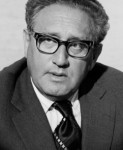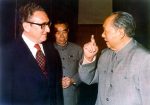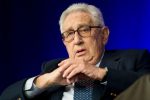 Henry Kissinger (1923- ) was an American security advisor and Secretary to State under president Richard Nixon. Kissinger was a controversial figure, mainly for his involvement in expanding and ending the Vietnam War. Born in Germany to Jewish parents, Kissinger’s parents emigrated to the US in 1938. He was drafted into the US Army five years later and posted to Europe. Kissinger held a low rank in the Army because of his foreign birth and modest education, yet he excelled as an administrator in post-war Germany. After the war Kissinger entered studies at Harvard, completing a doctorate in history and politics in 1954. After graduating he taught at Harvard, remaining on the teaching staff for more than a decade. During this period Kissinger also provided advice on foreign policy while forming contacts with influential political figures in the Republican party. Kissinger also visited Vietnam twice during the mid-1960s, reaching the conclusion that an American military victory there was unlikely.
Henry Kissinger (1923- ) was an American security advisor and Secretary to State under president Richard Nixon. Kissinger was a controversial figure, mainly for his involvement in expanding and ending the Vietnam War. Born in Germany to Jewish parents, Kissinger’s parents emigrated to the US in 1938. He was drafted into the US Army five years later and posted to Europe. Kissinger held a low rank in the Army because of his foreign birth and modest education, yet he excelled as an administrator in post-war Germany. After the war Kissinger entered studies at Harvard, completing a doctorate in history and politics in 1954. After graduating he taught at Harvard, remaining on the teaching staff for more than a decade. During this period Kissinger also provided advice on foreign policy while forming contacts with influential political figures in the Republican party. Kissinger also visited Vietnam twice during the mid-1960s, reaching the conclusion that an American military victory there was unlikely.
In 1967-68 Kissinger became close to Republican presidential candidate Richard Nixon. After Nixon’s election in November 1968, Kissinger was appointed to the White House staff. He became the president’s most trusted advisor on foreign affairs generally and the Vietnam War specifically, overshadowing Nixon’s first Secretary of State, William P. Rogers. Kissinger was both a pragmatist and a believer in realpolitik: he was prepared to negotiate secretly, compromise with his enemies and ignore moral problems or concerns, so long as this produced an outcome. This willingness to deal made Kissinger one of the main architects of Détente. Perhaps his most significant achievement in the context of the Cold War was to reestablish relations between the US and China. Kissinger visited China twice (July and October 1971) and cleared the path for Nixon’s groundbreaking visit there in February 1972. But US rapprochement with China was not just a goodwill gesture; it was designed to wedge the Soviet Union while gaining Chinese support for a peace deal with North Vietnam.

Kissinger did eventually secure a peace deal with the North Vietnamese – however, his involvement in the Vietnam War continues to divide opinion. When Kissinger’s frequent peace overtures to Hanoi were blocked, he convinced Nixon to intensify bombing in the North. He also recommended the secret bombing of communist bases in Cambodia and, later, US and South Vietnamese troop incursions there. Kissinger was opposed to Nixon’s policy of Vietnamisation, believing that it would embolden Hanoi and make a favourable peace settlement more difficult to achieve. Kissinger’s attempts to broker a peace deal did not bear fruit until 1972, after Nixon’s visit to China. During this period Kissinger held secret peace talks with North Vietnamese politician Le Duc Tho. These talks culminated in the Paris peace accords, signed in January 1973.

Kissinger’s forging of a peace agreement saw him hailed as a peacemaker, a brilliant negotiator who had secured an end to the Vietnam War. In December 1972 TIME magazine declared him its “Man of the Year”. Kissinger was appointed Secretary of State (September 1973) and the following month was awarded the Nobel Peace Prize, a joint award with Le Duc Tho. Not all were impressed by these accolades, however. Many considered Kissinger a key figure in prolonging the Vietnam War, expanding it beyond Vietnam and contributing to the rise of the genocidal Khmer Rouge in Cambodia. He was also complicit in the US-backed coup in Chile, which allowed the murderous Pinochet regime to seize power. Liberals condemned Kissinger as a dishonest warmonger; conservatives condemned him as a glory seeker willing to negotiate with communists and dictators. The fall of Saigon in April 1975 exposed the worthlessness of Kissinger’s 1973 peace deal. He remained as Secretary of State under Nixon and Gerald Ford, before moving into business consultancy and writing. Kissinger is still active today as a writer, an occasional political commentator and an advisor to modern politicians.
© Alpha History 2018-23. Content on this page may not be republished or distributed without permission. For more information please refer to our Terms of Use.
This page was written by Jennifer Llewellyn and Steve Thompson. To reference this page, use the following citation:
J. Llewellyn & S. Thompson, “Henry Kissinger”, Alpha History, accessed [today’s date], https://alphahistory.com/coldwar/henry-kissinger/.
